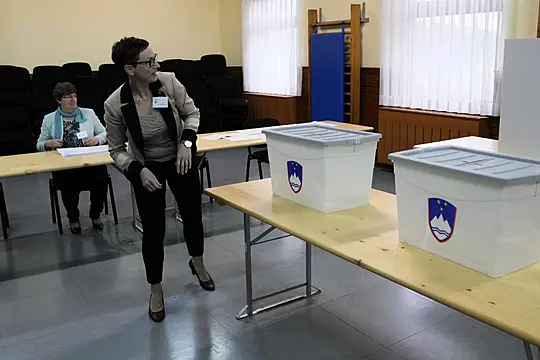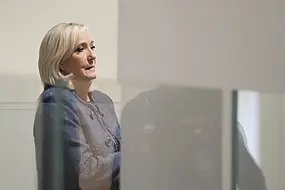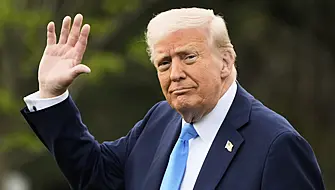Exit polls in Slovenia’s parliamentary vote on Sunday suggested a strong lead for the opposition liberals over the ruling right-wing populists of the prime minister, Janez Jansa.
The polls conducted by the Mediana polling agency and published by public broadcaster, TV Slovenia, and commercial Pop TV, showed the opposition Freedom Movement winning 35.8% support compared with the ruling conservative Slovenian Democratic Party with 22.5%.
Trailing behind the top two contenders were New Slovenia party with 6.8%, followed by Social Democrats with 6.6% and the Left party with 4.4%.
If confirmed in an official tally, the result means that the Freedom Movement, a newcomer in the election, stands a better chance of forming the next government in a coalition with smaller centre-left groups – a blow to Jansa, a populist who was accused of pushing the country to the right while in power.
The vote provoked a higher than usual turnout, reflecting strong voter interest in the race in the politically divided European Union nation.
Nearly 50% of Slovenia’s 1.7 million voters had cast ballots by mid-afternoon, according to state election authorities — up some 15% compared with the previous election in 2018.
Surveys before the vote predicted that no single party will be able to form a government on its own and that a coalition government will have to be formed after the vote, made up of at least three or four parties.
It still remained unclear which smaller groups will pass the 4% threshold and what the final distribution of parliamentary seats will look like. Election authorities also must add the early votes to the tally.
“Today is an important day as these elections decide how Slovenia will develop not only in the next four years, but in the next decade,” Mr Jansa said as he voted on Sunday. “Expectations are good.”
Mr Jansa became prime minister a little over two years ago after the previous liberal premier resigned. An admirer of former US president Donald Trump, Jansa has pushed the country to the right since taking over at the start of the Covid-19 pandemic.
The main challenger on Sunday was US-educated former business executive, Robert Golob, who heads the Freedom Movement party. The party has advocated green energy transition and sustainable development over Mr Jansa’s nation-centred narrative.
Mr Jansa’s SDS won the most votes in an election four years ago, but could not initially find partners for a coalition government. He took over after lawmakers from centrist and left-leaning groups switched sides following the resignation in 2020 of liberal prime minister, Marjan Sarec.
Mr Jansa has since faced accusations of sliding toward authoritarian rule in the style of his ally, Hungarian prime minister, Viktor Orban.
Mr Jansa came under EU scrutiny amid reports that he pressured opponents and public media, and installed loyalists in key positions for control over state institutions.
Liberals have described Sunday’s election as a referendum on Slovenia’s future. They argue that Mr Jansa, if re-elected, would push the traditionally moderate nation further away from “core” EU democratic values and toward other populist regimes.
The Freedom House democracy watchdog recently said that “while political rights and civil liberties are generally respected (in Slovenia), the current right-wing government has continued attempts to undermine the rule of law and democratic institutions, including the media and judiciary.”
The 63-year-old political veteran Mr Jansa has denied this, portraying himself as a victim of an elaborate leftist smear plot. In order to polish his image before the election, Mr Jansa has distanced himself from Mr Orban and adopted a tough stance toward Russia over the invasion of Ukraine.







